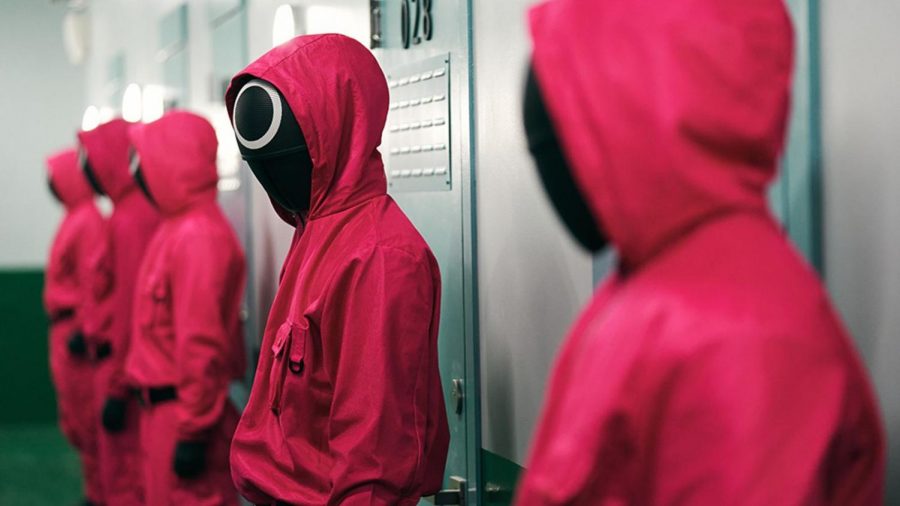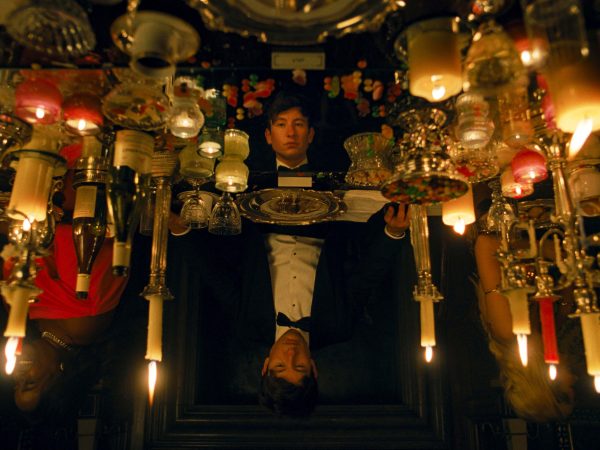REVIEW: Squid Game Is Really Clever Until It Isn’t
Squid Game’s guards, shown here in loud pink jumpsuits, are treated just as disposably as it’s players.
It’s ten minutes into Squid Game. Seong Gi-hun has his back to the wall between two yellowed urinals, and a creepy money-lender is holding a bowl to his nose while threatening to harvest blood from his capillaries, which will be sold to pay for his textbooks. Just kidding! The only people that pay for textbooks by selling their blood are EvCC students. Instead, Gi-hun signs his rights over to a cabal of creepy rich people who force him and hundreds of other desperate people to wear green jumpsuits and play a game of Red Light, Green Light where the losers get shot in the head.
Naturally, the part where people choose to willingly come back and play more psychotic children’s games has some claiming that Squid Game is past the point of suspension of disbelief. However, Squid Game is a satire. Not in the funny way, but satire doesn’t always use humor. Sometimes it uses only exaggeration. Being shot in the head for moving on the red light is just Netflix’s exaggerated version of falling into poverty because you lost your job. Oh, you don’t want to play our game of ‘Simon Says?’ the Gods chide from Corporate’s office high on the slopes of Olympus; Then starve to death, peasant. No, I think the choice is a lot easier for some people than you might imagine.

In fact, Squid Game’s cleverest sleight of hand comes in the form of a constant and vicious disconnect between the stated ideology of the game’s creators and how it works in practice. The Pink PlayStation Squad waste no time in reminding the players that they signed up to play, yet mysteriously ignore that at least one of these release forms was signed with the client’s bloody thumb-print at the behest of literally bloodthirsty loan sharks. (Remember? He, like, licks the blood? Gross, dude.) Before the players even sign their “consent” forms, they’re treated to a monologue about fairness from the gamerunners. And how skillfully that fairness is belied by the show runners! Players smuggle in everything from lighters to pocket knives; sleazy gangster Deok-su has no trouble falling into the gang leader role just as he does in the outside world- a role which affords him protection when the Geometry Police encourage the players to murder each other in a horrific night-time purge. At some camera angles, the guards’ obliviousness to the rule breakers becomes too hard to believe- an indication it may be intentional. The game runners are playing a sophisticated psychological game with the contestants wherein the most ruthless, manipulative, and opportunistic will find success. The one true rule is “don’t get caught,” and the game itself is a machine for producing exactly the type of people that run it, and exactly the type of people that succeed in modern capitalism.

Hey, by the way, remember this? I brought that up because I wanted to show the desperation of Squid Game’s protagonists, and their subsequent desperate decisions, as something close to home. But what if, instead of seeing that ad as a symptom of capitalism or poverty, the meme-maker had seen it as a sign that evil vampires controlled the school’s textbook supply? Wouldn’t that have been really stupid? Because that’s exactly how stupid Squid Game’s interpretation of it’s villains’ motives is. Before the final (terrible) twist of the show, we meet the Foreign VIP’s meant to be the show’s patrons. Sporting masks straight out of Eyes Wide Shut and acting reminiscent of the conversations video game enemies have before they realize you’re in the room, the sadistic elites represent the kind of Epsteinian depravity produced by extreme inequalities of power and wealth. This depravity, however, is far from the only driver of the kinds of problems Squid Game wants to tackle.
Which is why it’s so disappointing to see that, in the end, when the host’s identity and motive are revealed, it turns out to be retreading the exact same thematic ground covered by the VIP’s rather than something deeper, more complex, or more interesting. Mere sadism and boredom are ascribed to the authors of the game- which wouldn’t be a problem if the game itself wasn’t a metaphor for our own reality. “The ultra-rich are inundated with sadists” may be a true statement, but falls short as an explanation for poverty and debt slavery.
That’s part of Squid Game’s DNA, though. An impulse to provocation. It’s the same impulse that produces the shocking displays of violence the show has become famous for. In this context, the impulse produces something conducive to the show’s goal: an exaggeration of capitalism’s violence, a mirror of our own world. But in producing the most shocking and provoking motives possible, Squid Game defangs itself, shrinking it’s critique from one of systems to one of evil individuals; a matter of bad apples.
In the end, Squid Game won’t explore the ideas it raises all the way, because it’s not like the people playing it. It’s not willing to risk it all for the prize.

What interests you about journalism?
I love that I can get unfailingly interesting stories from just talking to regular people about their lives,...



















